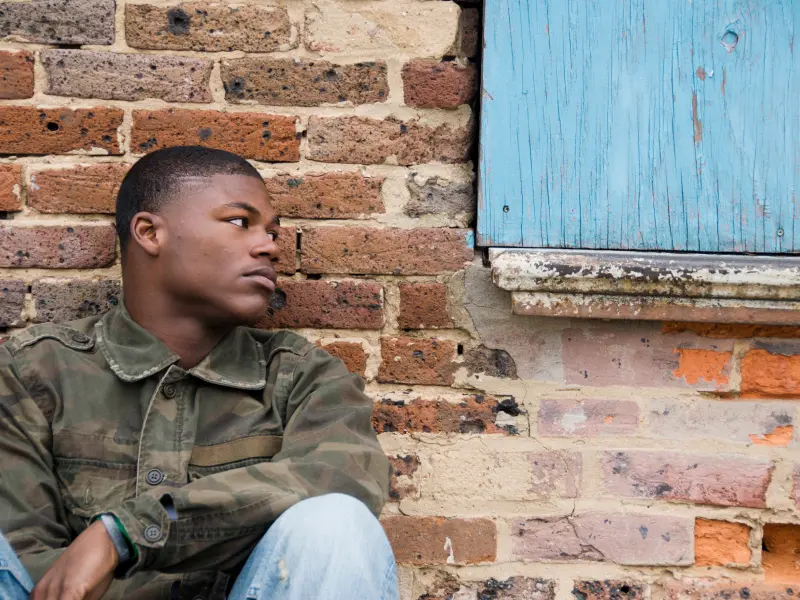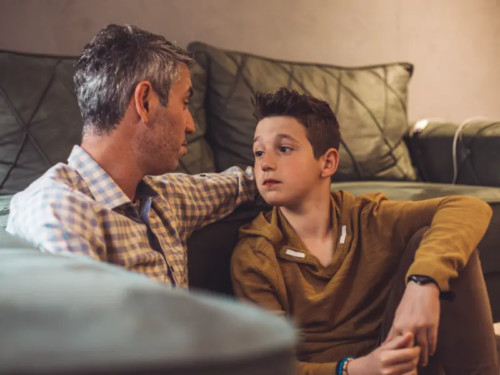
Table of Contents
What’s the Relationship Between Grief and Trauma?

Written By: Dr. Rasna Kaur Neelam

Clinically Reviewed By: Dr. Don Gasparini
Updated: December 12, 2023
5 min.
Grief and trauma can intersect, but the two are distinct emotional experiences: not all grief involves trauma, and not all trauma involves grief.
Learn more about our Clinical Review Process
Table of Contents
Grief and trauma both describe powerful feelings felt after the loss of a loved one (in grief) or a painful event (in trauma). Grief and trauma can sometimes intersect, like in the case of a sudden or violent traumatic loss, but the two are distinct emotional experiences—not all grief involves trauma, and not all trauma involves grief. Both, however, can greatly impact a person’s mental health. Below, we delve into the differences and similarities between grief and trauma and explore how to tell if grief or trauma therapy is right for you.

Healing is possible
Treatment for complex mental health conditions from the comfort of your home.
What is the difference between grief and trauma?
As mentioned, grief is a response to loss, whereas trauma is a response to a distressing event that overwhelms a person’s ability to cope. Here’s a brief overview of grief and trauma that highlights the difference between each experience.
What is grief?
Grief is a collection of strong, often painful, feelings that follow a loss or happen in anticipation of a loss. Essentially, it is the emotional response to losing something or someone you care about. Grief can be triggered by various types of loss, including the death of a loved one, the end of a relationship, the loss of a job, or other significant life changes. Experts agree there is no “normal” when it comes to grief—it is a natural human reaction that feels and looks different for each. Some people’s grief may include a sense of relief that their loved one is no longer in pain, whereas others may experience sadness, anger, guilt, or confusion. Grief is a process that all people go through to come to terms with their loss and find ways to adapt to the changes in their lives.
What is trauma?
Trauma, on the other hand, refers to the emotional and psychological response to an event that is deeply distressing or disturbing. Trauma, like grief, can result from a loss, but it can also result from other overwhelming events, like a car accident, physical assault, or natural disaster. It can also be the cumulative effect of ongoing stress and adversity, such as childhood abuse or neglect. Trauma often has a lasting impact on a person’s mental and emotional well-being, affecting their ability to cope with stress, form relationships, and navigate the world. Symptoms of trauma can include intrusive memories, flashbacks, anxiety, hypervigilance, and avoidance of reminders of the traumatic event.
How do trauma and grief relate to each other?
Trauma and grief can be interconnected, especially when a person experiences a loss that is also traumatic in nature. In such cases, people may simultaneously grapple with both grief and trauma. Here are some ways in which trauma and grief can relate to each other:
Traumatic loss
A traumatic loss is a situation where a death or loss itself is highly distressing or shocking. Sudden and unexpected deaths, accidents, acts of violence, or disasters are examples of traumatic loss that can lead to traumatic grief. In these situations, people not only mourn the loss of a loved one but may also experience symptoms associated with trauma due to the distressing circumstances surrounding the loss.
Complicated grief
Also known as persistent complex bereavement disorder, complicated grief is defined as persistent feelings of sadness that cause functional impairment for at least a year after a loss. Complicated grief is, in essence, a more prolonged and intense form of grief that, for many people, may be associated with trauma—like losing a spouse or child. Instead of grief becoming manageable with time, people with complicated grief will continue to find that grief impairs day-to-day life, sometimes for years.
Delayed grief
Trauma may initially suppress or delay the grieving process. In some cases, individuals might be so focused on coping with the aftermath of a traumatic event that they don’t fully engage with their grief until later. For example, someone who survives a natural disaster that resulted in the loss of their home and the lives of some family members might initially be in a state of traumatic shock and only process the emotional impact of the loss (grief) after the acute phase of trauma has ended.
Impact on mental health
Trauma and grief can both have profound impacts on mental health, though sometimes in different ways. Trauma can result in a range of mental health challenges, including post-traumatic stress disorder (PTSD), anxiety, depression, and disruptions in one’s sense of safety and trust. Grief, on the other hand, can encompass a complex array of emotions, such as sadness, anger, guilt, and confusion. Complicated grief may contribute to conditions like major depressive disorder.
Need for professional support
People enduring either trauma or grief (or, in some instances, both experiences) may benefit from professional mental health support. Therapists experienced in trauma and grief counseling can help people navigate the complex emotions and challenges associated with both of these experiences.

How can you tell if you need grief or trauma therapy?
Grief counseling, also known as grief therapy, is a form of therapy specifically designed to support people who are experiencing grief and loss. By contrast, trauma therapy is a specialized form of mental health treatment designed to help people process and cope with traumatic events.
When deciding if you need grief or trauma therapy, it’s helpful to consider what you’re coping with and what your symptoms look like. Either way, if your emotions are impacting your well-being and day-to-day life, it’s important to work with a mental health professional—they can assess your situation, discuss your concerns, and suggest the right therapy for you.
Here are some signs that may suggest the need for grief or trauma therapy:
Signs you may need grief therapy
- Persistent and intense emotions in response to a loss that significantly impacts your well-being and ability to function in day-to-day life or engage in relationships
- Difficulty adapting to the challenges resulting from a loss
- Complicated grief symptoms, such as ongoing sadness or difficulty accepting the reality of the loss

Signs you may need trauma therapy
- Intrusive symptoms like flashbacks, nightmares, or distressing memories related to traumatic events
- Persistent hypervigilance, heightened startle response, or avoidance of reminders of the traumatic event, which may be symptoms of post-traumatic stress disorder (PTSD)
- Trauma or PTSD symptoms that make it hard for you to take care of yourself, function in day-to-day life, maintain relationships, or hold employment
Support for grief and trauma at Charlie Health
If grief or trauma symptoms are impacting your mental health, Charlie Health is here to help. Charlie Health’s virtual Intensive Outpatient Program (IOP) provides more than once-weekly mental health treatment for young people dealing with complex mental health conditions, including PTSD symptoms, traumatic bereavement, and more. Our expert clinicians incorporate evidence-based trauma-focused therapies into individual counseling, family therapy, and group sessions. With treatment, managing your grief or trauma response is possible. Fill out the form below or give us a call to start healing today.




